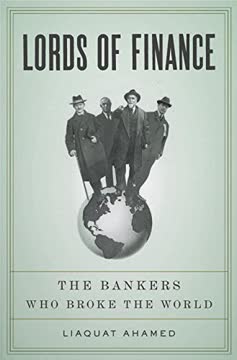Key Takeaways
1. Machiavelli's life as a diplomat shaped his political philosophy
Machiavelli was fascinated to see how Julius would cope with the dilemma raised by the duke's presence at the papal court.
Diplomatic experiences. Machiavelli's career as a diplomat exposed him to the intricacies of power politics and statecraft. He observed firsthand the actions of influential leaders like Cesare Borgia, Pope Julius II, and Emperor Maximilian, which provided him with invaluable insights into the nature of political power and leadership.
Lessons learned. Through his diplomatic missions, Machiavelli developed his key ideas on:
- The importance of adaptability in politics
- The role of fortune and virtue in achieving success
- The need for leaders to sometimes act against conventional morality
- The value of maintaining appearances and managing public perception
These observations formed the foundation of his later political writings, including "The Prince" and the "Discourses on Livy," and shaped his realistic, often cynical approach to politics.
2. The Prince: A revolutionary guide to power and statecraft
The moral is obvious: if a man wishes to attain glory and greatness, he must be wise enough to accommodate himself to the times.
Breaking with tradition. "The Prince" represented a radical departure from traditional political thought. Machiavelli rejected the idealistic notions of how rulers should behave, instead focusing on practical advice for maintaining power in a hostile world.
Key principles:
- Prioritize effectiveness over moral considerations
- Cultivate a reputation for strength and decisiveness
- Be willing to use both force and cunning as necessary
- Maintain the appearance of virtue while being prepared to act against it
Machiavelli's work shocked his contemporaries with its candid discussion of political realities and its seeming disregard for Christian ethics. However, it has endured as a seminal text in political philosophy, influencing leaders and thinkers for centuries.
3. Virtù: The cornerstone of Machiavellian leadership
Virtú comes to denote precisely the requisite quality of moral flexibility in a prince: 'He must be prepared to vary his conduct as the winds of fortune and changing circumstance constrain him'.
Redefining virtue. Machiavelli's concept of virtù differs significantly from traditional notions of moral virtue. In his view, virtù encompasses the qualities that enable a leader to achieve and maintain power, regardless of their moral implications.
Components of virtù:
- Adaptability to changing circumstances
- Willingness to act decisively and sometimes ruthlessly
- Skill in managing public perception
- Ability to balance force and cunning
- Prioritization of practical outcomes over moral considerations
For Machiavelli, a leader with virtù is one who can navigate the complex and often treacherous world of politics, using whatever means necessary to achieve their goals and maintain their power. This concept remains controversial but influential in modern political thought.
4. Fortune's role in political success and the importance of adaptability
Fortune is a woman, and if you want to control her, it is necessary to treat her roughly.
Fortune vs. free will. Machiavelli sees political success as a product of both fortune (chance or luck) and virtù (skill and ability). While he acknowledges the significant role of fortune, he argues that skillful leaders can influence and even control their fate to a large extent.
Adapting to circumstances:
- Leaders must be flexible and able to change their approach as situations demand
- Rigid adherence to a single strategy or moral code often leads to failure
- Success comes from recognizing opportunities presented by fortune and seizing them with virtù
Machiavelli's metaphor of fortune as a woman to be dominated reflects his belief that proactive, sometimes aggressive action is necessary to overcome the vicissitudes of chance. This view emphasizes the importance of adaptability and opportunism in political leadership.
5. The Discourses: Machiavelli's vision of republican governance
Experience shows that cities have never increased in dominion or riches except while they have been at liberty.
Republican ideals. In the "Discourses on Livy," Machiavelli explores the principles of successful republican government, using ancient Rome as his primary example. He argues that republican systems, when properly structured, can achieve greater stability and success than princely states.
Key elements of a successful republic:
- Mixed constitution balancing the interests of the nobility and the people
- Strong civic virtue among citizens
- Effective laws and institutions to prevent corruption
- Citizen militias rather than mercenary armies
- Controlled political conflict as a source of strength and innovation
Machiavelli's analysis in the Discourses presents a more nuanced and complex view of politics than "The Prince," emphasizing the importance of popular participation and institutional checks on power. This work has been influential in the development of modern republican and democratic thought.
6. Corruption as the greatest threat to political stability and liberty
When it is absolutely a question of the safety of one's country, there must be no consideration of just or unjust, of merciful or cruel, of praiseworthy or disgraceful; instead, setting aside every scruple, one must follow to the utmost any plan that will save her life and keep her liberty.
The dangers of corruption. Machiavelli identifies corruption as the primary threat to political stability and freedom. He argues that as citizens and leaders prioritize personal or factional interests over the common good, the foundations of the state are undermined.
Manifestations and consequences of corruption:
- Erosion of civic virtue and public-spiritedness
- Manipulation of laws and institutions for personal gain
- Rise of factionalism and internal conflict
- Weakening of military capabilities
- Vulnerability to external threats and loss of independence
To combat corruption, Machiavelli advocates for strong laws, institutions that promote civic virtue, and leaders willing to take decisive (sometimes harsh) action to preserve the state's integrity. His perspective on corruption remains relevant in analyses of modern political systems and their challenges.
7. The art of war and the importance of citizen armies
A wise prince will always avoid using these troops and form armies composed of their own men.
Military power and political stability. Machiavelli emphasizes the crucial link between military strength and political success. He argues that reliance on mercenary or auxiliary troops is dangerous and unreliable, advocating instead for citizen militias.
Advantages of citizen armies:
- Greater loyalty and commitment to the state
- Improved military effectiveness through civic virtue
- Reduced risk of military coup or betrayal
- Strengthened bond between the people and the state
Machiavelli's ideas on military organization were revolutionary for his time, challenging the prevalent use of mercenary forces. His emphasis on citizen participation in defense reflects his broader belief in the importance of civic engagement for the health of the state.
8. Machiavelli's approach to history: Learning from the past to shape the future
Instead of recounting a story that 'kindles free spirits to imitation', he hopes to 'kindle such spirits to avoid and get rid of present abuses'.
History as a teacher. Machiavelli views history not merely as a chronicle of past events, but as a source of practical lessons for contemporary politics. He argues that by studying historical successes and failures, leaders can derive principles for effective governance.
Key aspects of Machiavelli's historical approach:
- Focus on practical lessons rather than moral exemplars
- Analysis of both successes and failures to extract useful principles
- Emphasis on understanding the underlying causes of historical events
- Application of historical insights to contemporary political challenges
In his "History of Florence," Machiavelli departs from the traditional laudatory approach to historiography, instead using historical analysis to critique contemporary political failings. This pragmatic approach to history as a guide for political action has been influential in both historical scholarship and political theory.
Last updated:
FAQ
What's "Machiavelli: A Very Short Introduction" about?
- Overview of Machiavelli: The book provides a concise introduction to the life and works of Niccolò Machiavelli, focusing on his political theories and historical context.
- Key Works Discussed: It covers Machiavelli's most famous works, including "The Prince" and "Discourses on Livy," and explores their impact on political thought.
- Historical Context: The book situates Machiavelli within the political and intellectual landscape of Renaissance Italy, highlighting his role as a diplomat and political theorist.
- Themes and Ideas: It delves into Machiavelli's ideas on power, statecraft, and human nature, examining how these concepts have influenced modern political theory.
Why should I read "Machiavelli: A Very Short Introduction"?
- Comprehensive Introduction: The book offers a thorough yet accessible overview of Machiavelli's life and ideas, making it ideal for newcomers to his work.
- Understanding Political Theory: It provides insights into the foundations of modern political thought, particularly the concepts of power and governance.
- Historical Insight: Readers gain a deeper understanding of the political dynamics of Renaissance Italy and how they shaped Machiavelli's theories.
- Influence on Modern Politics: The book highlights Machiavelli's lasting impact on political philosophy and his relevance to contemporary discussions on leadership and ethics.
What are the key takeaways of "Machiavelli: A Very Short Introduction"?
- Power and Virtú: Machiavelli emphasizes the importance of virtú, a combination of strength, cunning, and pragmatism, in effective leadership.
- Role of Fortune: He discusses the interplay between fortune and human agency, suggesting that while fortune influences events, leaders can shape outcomes through virtú.
- Realpolitik Approach: Machiavelli advocates for a realistic approach to politics, where moral considerations are secondary to the maintenance of power and stability.
- Historical Lessons: The book underscores the value of learning from history to understand political dynamics and avoid past mistakes.
How does Quentin Skinner interpret Machiavelli's concept of virtú?
- Definition of Virtú: Skinner explains virtú as a set of qualities that enable leaders to achieve and maintain power, including decisiveness, adaptability, and strategic thinking.
- Moral Flexibility: Machiavelli's virtú involves a willingness to act immorally when necessary to secure the state, challenging traditional moral values.
- Contrast with Classical Virtues: Unlike classical virtues, which emphasize moral integrity, Machiavelli's virtú is pragmatic and results-oriented.
- Application in Leadership: Skinner highlights how virtú is crucial for leaders to navigate the complexities of political life and respond effectively to changing circumstances.
What is Machiavelli's view on the role of fortune in politics?
- Fortune's Influence: Machiavelli acknowledges that fortune plays a significant role in political success, but it is not the sole determinant.
- Balancing Fortune and Virtú: He argues that while fortune can create opportunities, leaders must possess virtú to capitalize on them and mitigate risks.
- Fortune as a Woman: Machiavelli famously describes fortune as a woman who favors bold and aggressive leaders, suggesting that assertiveness can sway fortune's favor.
- Limits of Fortune: Ultimately, Machiavelli believes that human agency, through virtú, can shape events and counteract the unpredictability of fortune.
How does "Machiavelli: A Very Short Introduction" address Machiavelli's reputation as a "teacher of evil"?
- Misinterpretation of Machiavelli: Skinner argues that Machiavelli's reputation as a proponent of evil is a misunderstanding of his pragmatic approach to politics.
- Focus on Realism: Machiavelli's advice is grounded in realism, emphasizing the necessity of sometimes unethical actions to maintain power and stability.
- Contextual Understanding: The book places Machiavelli's ideas within the context of Renaissance Italy, where political instability required pragmatic solutions.
- Legacy and Impact: Despite his controversial reputation, Machiavelli's work has profoundly influenced political thought, highlighting the complexities of leadership and ethics.
What are the best quotes from "Machiavelli: A Very Short Introduction" and what do they mean?
- "Fortune is a woman": This quote encapsulates Machiavelli's view that fortune favors bold and assertive leaders, emphasizing the need for decisive action.
- "The ends justify the means": Although not a direct quote, this idea reflects Machiavelli's belief that achieving political stability may require morally questionable actions.
- "It is better to be feared than loved": Machiavelli argues that fear is a more reliable means of maintaining power than love, as it ensures obedience and control.
- "A prince must be a fox to recognize traps, and a lion to frighten wolves": This metaphor highlights the dual nature of effective leadership, combining cunning with strength.
How does Quentin Skinner explore Machiavelli's influence on modern political thought?
- Foundations of Realpolitik: Skinner discusses how Machiavelli's ideas laid the groundwork for realpolitik, emphasizing pragmatic and strategic approaches to governance.
- Impact on Political Philosophy: The book examines Machiavelli's influence on later political theorists, including Hobbes and Rousseau, who grappled with similar themes of power and authority.
- Relevance to Contemporary Politics: Skinner highlights how Machiavelli's insights into power dynamics and human nature continue to inform modern political discourse and leadership strategies.
- Critiques and Adaptations: The book explores how Machiavelli's work has been both criticized and adapted by various political movements, reflecting its enduring significance.
What is Machiavelli's perspective on the relationship between ethics and politics?
- Separation of Ethics and Politics: Machiavelli argues that political leaders must prioritize the stability and security of the state over traditional moral values.
- Necessity of Immorality: He suggests that rulers may need to engage in immoral actions to achieve political goals, challenging the notion that ethics and politics are inherently linked.
- Pragmatic Approach: Machiavelli's perspective is rooted in pragmatism, advocating for actions that ensure the survival and success of the state, regardless of ethical considerations.
- Critique of Idealism: He critiques idealistic views of politics that prioritize moral integrity, arguing that such approaches are often impractical and ineffective in the real world.
How does "Machiavelli: A Very Short Introduction" address the historical context of Machiavelli's work?
- Renaissance Italy: The book situates Machiavelli within the turbulent political landscape of Renaissance Italy, marked by city-state rivalries and foreign invasions.
- Florentine Politics: It explores Machiavelli's role as a diplomat and political advisor in Florence, highlighting how his experiences shaped his views on power and governance.
- Influence of Classical Thought: Skinner discusses the impact of classical Roman and Greek ideas on Machiavelli's work, particularly in his emphasis on virtú and the role of history.
- Response to Political Instability: Machiavelli's theories are presented as a response to the political instability of his time, offering practical solutions for maintaining power and order.
What lessons does Machiavelli draw from Roman history in "Discourses on Livy"?
- Value of Mixed Constitutions: Machiavelli praises the Roman Republic's mixed constitution, which balanced the interests of different social classes and maintained stability.
- Importance of Civic Virtú: He emphasizes the role of civic virtú in Rome's success, highlighting the need for citizens to prioritize the common good over personal interests.
- Lessons from Roman Leaders: Machiavelli draws lessons from Roman leaders like Romulus and Camillus, who exemplified the qualities of effective leadership and virtú.
- Warnings Against Corruption: He warns against the dangers of corruption and factionalism, which can undermine the stability and greatness of a republic.
How does Quentin Skinner interpret Machiavelli's views on leadership and statecraft?
- Pragmatic Leadership: Skinner interprets Machiavelli's views as advocating for pragmatic leadership, where rulers must be adaptable and willing to make difficult decisions.
- Balance of Fear and Love: Machiavelli's advice to balance fear and love in leadership is seen as a strategy to maintain control and ensure loyalty.
- Role of Deception: Skinner highlights Machiavelli's belief in the necessity of deception and cunning in statecraft, as leaders must navigate complex political landscapes.
- Focus on Outcomes: Machiavelli's emphasis on outcomes over intentions is interpreted as a call for leaders to prioritize the success and stability of the state above all else.
Review Summary
Machiavelli: A Very Short Introduction is generally well-received, with readers appreciating Skinner's concise yet comprehensive overview of Machiavelli's life, works, and political philosophy. Many find it helpful for understanding Machiavelli's context and ideas beyond just "The Prince." Some readers note it clarifies misconceptions about Machiavelli and provides valuable insights into his lesser-known works. While a few find it dry or overly focused on historical details, most consider it an excellent introduction to Machiavelli's thought and influence.
Very Short Introductions Series Series



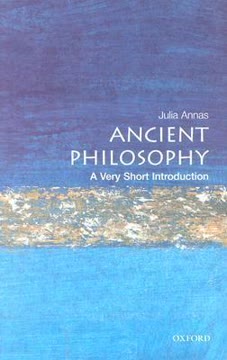
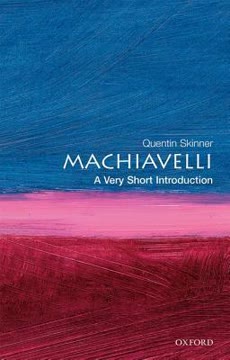


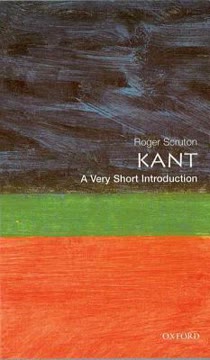


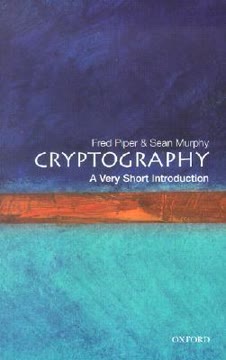

Similar Books
Download PDF
Download EPUB
.epub digital book format is ideal for reading ebooks on phones, tablets, and e-readers.





